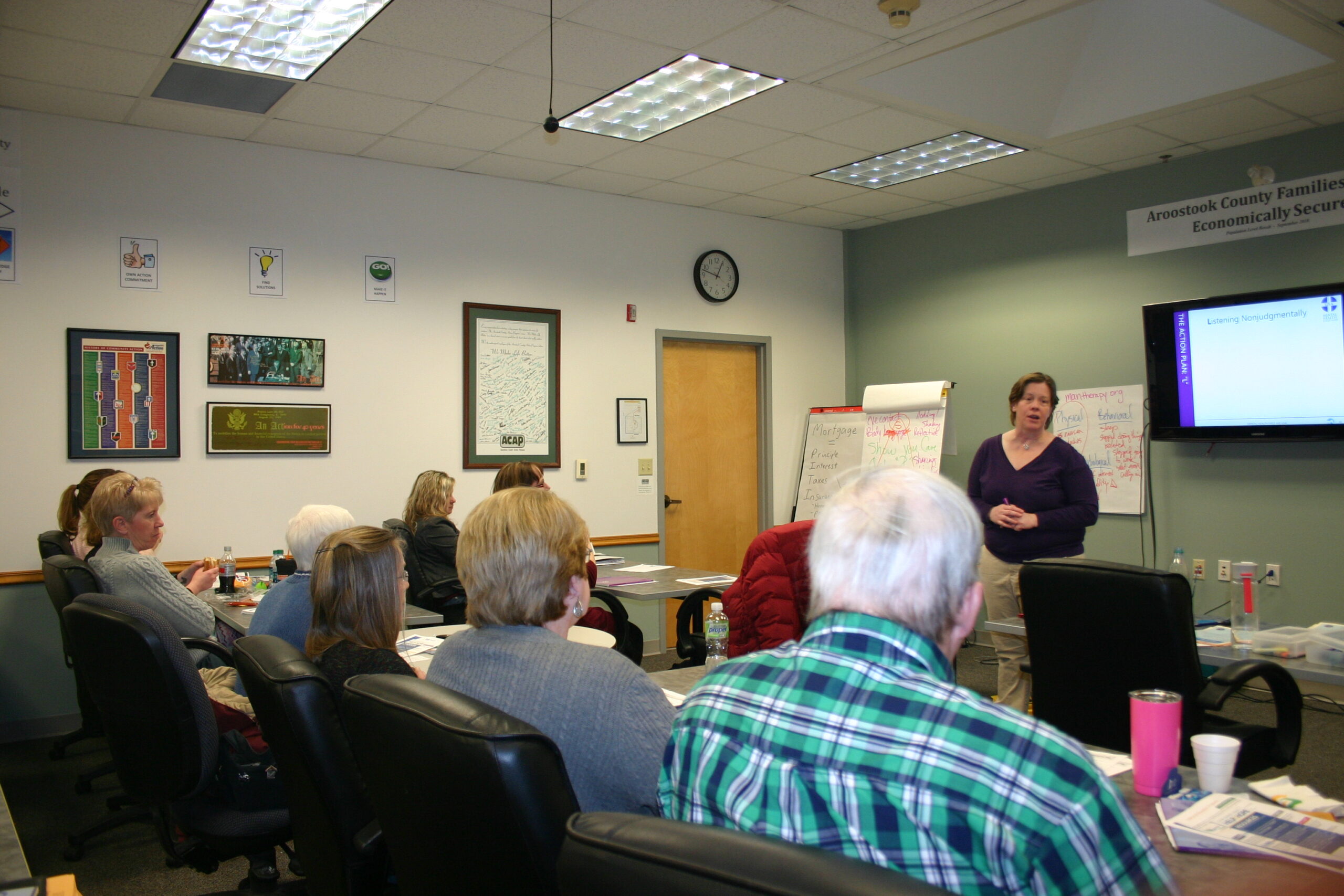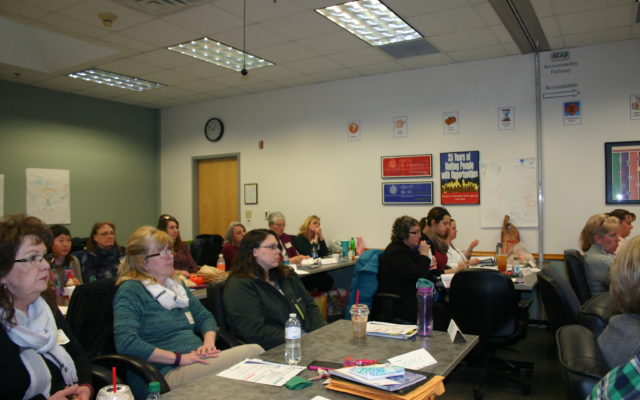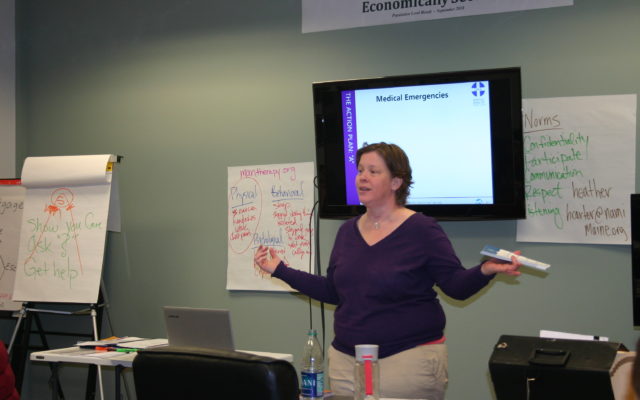
PRESQUE ISLE, Maine — Over the course of three days this month, 105 Aroostook County employees in the social services field received training in “mental health first aid,” focused on awareness of and resources available to individuals who struggle with mental illness.
Heather Carter, director of prevention and youth programs for the National Alliance on Mental Illness Maine Chapter, held one eight-hour mental health first aid training session for 35 people each day Feb. 7-9 at the Aroostook County Action Program’s Presque Isle office. Her goal was to help individuals broaden their knowledge about the warning signs and risk factors associated with mental illness and how they can assist clients in accessing available resources.
According to https://www.mentalhealthfirstaid.org/, the training was created in 2001 by Australian nurse Betty Kitchener, who specialized in health education. Mental Health First Aid is an evidence-based training that emphasizes, “recovery and resiliency — the belief that individuals experiencing these challenges can and do get better, and use their strengths to stay well.” At the end of each training, employees received three-year mental health certification.
“A training like this increases awareness and the likelihood that an employee can identify someone who is struggling with mental illness and connect with them,” Carter said. “Whether you work at a program like ACAP or in a hospital, your chances of connecting with someone who has mental illness are high.”
During each training, Carter explained the characteristics of common mental health issues such as depression, anxiety, trauma, psychosis, schizophrenia and substance use disorders. Much of her discussions focused on the Mental Health First Aid Action Plan, often abbreviated as ALGEE. The acronym stands for: Assess for risk of suicide or harm; Listen non judgmentally; Give reassurance and information; Encourage appropriate professional help; and Encourage self-help and other support strategies.
Carter suggested that when listening to clients, employees follow the person’s lead and use strategies that help them feel more comfortable with opening up. She said that although society often values eye contact as a sign of respect, that concept doesn’t apply to children who have autism, who typically struggle with social cues, or individuals whose culture doesn’t emphasize eye contact.
Carter also encouraged employees to use other tactics to increase a client’s comfort level, such as sitting next to them, talking to them outside of the office or letting them fidget instead of remaining still in their seat. But no matter what, she noted, the most important thing is to understand sympathy versus empathy.
“Feeling sorry for the person won’t benefit them because sympathy makes them feel more like a victim and that’s a very powerless feeling,” Carter said. “You need to let the person know that you’re at least trying to understand what they’re going through.”
Those who attended the Mental Health First Aid trainings had much praise for the topics Carter covered and said that the information they received will help them when interacting with clients who have mental illness.
“I’m the only hospital social worker and I interact with patients on all floors from the emergency room to oncology,” said Michelle Williams of Cary Medical Center in Caribou who attended the Feb. 8 session. “The training gives us the tools to let people know that they’re not alone and to connect them with the right people in the community.”
Several ACAP employees who attended the trainings also said that what they learned will help them when interacting with families who come to ACAP for various services.
“The training has taught me when to be quiet and just listen to clients. The more knowledge we have, the more we will be able to help those we serve,” Vicki Bolstridge, ACAP administrative assistant, said. Bolstridge has worked at ACAP for 38 years and attended Carter’s Feb. 8 training.
Gayla Allen, ACAP family head coach, went to the Feb. 7 training and noted that although she has received mental health training before, she is always willing to work on both familiar and new techniques to help individuals.
“I work with families one-on-one and many of them struggle with mental health challenges of some kind,” Allen said. “There’s much to learn about recognizing when someone is experiencing a mental health crisis and how we could help them.”
Carter believes that Mental Health First Aid is an important training to offer in Aroostook County because issues surrounding poverty and unemployment could make an individual’s mental health struggles even greater. But she believes that employees with the right skills and knowledge can help those individuals live a full, healthy life.
“Stigma is the biggest barrier for individuals receiving mental health services. There’s this fear that their families, employers and friends will judge them and often even those people won’t offer help because of assumptions that mental health is the person’s fault,” Carter said. “Education is the best response to that stigma, giving people the tools to recover and live a full life.”
- Employees of area social services organizations and hospitals listen to Heather Carter, director of prevention and youth programs for the National Alliance on Mental Illness Maine Chapter, during her Mental Health First Aid Training at ACAP’s Presque Isle office on Feb. 8. (Melissa Lizotte)
- Heather Carter, director of prevention and youth programs for the National Alliance on Mental Illness Maine Chapter, speaks to attendees during her Mental Health First Aid Training on Feb. 8 at ACAP’s Presque Isle office. Carter held three trainings on Feb. 7, 8, and 9 that focused on recognizing signs of individuals’ mental health struggles and how to best offer available resources. (Melissa Lizotte)









